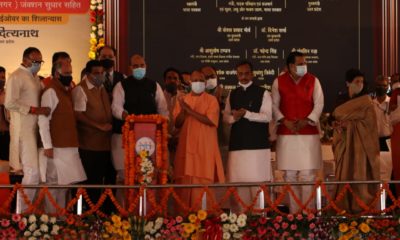Feature
CSIR– IITR celebrated their Golden Jubilee Annual Day
Lucknow: City based premier toxicology institute of the country, CSIR – Indian Institute of Toxicology Research celebrated its Golden Jubilee Annual Day on November 14, 2016 at the institute premise, situated at 31 Mahatma Gandhi Marg, Lucknow. Honourable Governor of Uttar Pradesh, Shri Ram Naik, was the chief guest of the function which started at 4.45 pm in the evening. Professor Brian Cantor, Vice Chancellor, University of Bradford, United Kingdom, was the guest of honour.
Professor Alok Dhawan, Director of the institute welcomed the gathering and presented the annual report of the institute for the year 2015-2016. He enumerated several notable contributions of the institute in the year gone by and said that it was a moment to rededicate oneself to fulfilling the mission of the institute. While delivering the foundation day address, Professor Cantor touched upon the fact that both the institute have a lot in common in their goal of societal service.
Honourable Governor of Uttar Pradesh, Shri Ram Naik gave the presidential address and congratulated the CSIR – IITR family on the important milestone while simultaneously urging the institute not to rest on past laurels. He exhorted the scientists to work towards fulfilling the dreams of the founding fathers of the nation. On this occasion, IITR Annual Report, scientific publications, a book on Comet assay, post monsoon Environmental Monitoring report, Pamphlets on health of women and environment were also released by the governor along with the launch of the Institute’s disabled friendly website as per the norm of Government of India.
A memorandum of understanding for Scientific Collaborations between CSIR – IITR and University of Bradford was also signed in the presence of the Honourable Governor. Dr. Devendra Parmar Chief Scientist and Dr. D. Kar Chowdhuri, Chief Scientist introduced the guests and proposed a vote of thanks respectively. The celebrations concluded with a cultural extravaganza by the research scholars of the institute which brought forth their creative and innovative capabilities.
Entertainment
Meghalaya Reserves Legalized Gambling and Sports Betting for Tourists

The State Scores Extra High on Gaming-Friendly Industry Index
Meghalaya scored 92.85 out of 100 possible points in a Gaming Industry Index and proved to be India’s most gaming-friendly state following its recent profound legislation changes over the field allowing land-based and online gaming, including games of chance, under a licensing regime.
The index by the UK India Business Council (UKIBC) uses a scale of 0 to 100 to measure the level of legalisation on gambling and betting achieved by a state based on the scores over a set of seven different games – lottery, horse racing, betting on sports, poker, rummy, casino and fantasy sports
Starting from February last year, Meghalaya became the third state in India’s northeast to legalise gambling and betting after Sikkim and Nagaland. After consultations with the UKIBC, the state proceeded with the adoption of the Meghalaya Regulation of Gaming Act, 2021 and the nullification of the Meghalaya Prevention of Gambling Act, 1970. Subsequently in December, the Meghalaya Regulation of Gaming Rules, 2021 were notified and came into force.
All for the Tourists
The move to legalise and license various forms of offline and online betting and gambling in Meghalaya is aimed at boosting tourism and creating jobs, and altogether raising taxation revenues for the northeastern state. At the same time, the opportunities to bet and gamble legally will be reserved only for tourists and visitors.
“We came out with a Gaming Act and subsequently framed the Regulation of Gaming Rules, 2021. The government will accordingly issue licenses to operate games of skill and chance, both online and offline,” said James P. K. Sangma, Meghalaya State Law and Taxation Minister speaking in the capital city of Shillong. “But the legalized gambling and gaming will only be for tourists and not residents of Meghalaya,” he continued.
To be allowed to play, tourists and people visiting the state for work or business purposes will have to prove their non-resident status by presenting appropriate documents, in a process similar to a bank KYC (Know Your Customer) procedure.
Meghalaya Reaches Out to a Vast Market
With 140 millions of people in India estimated to bet regularly on sports, and a total of 370 million desi bettors around prominent sporting events, as per data from one of the latest reports by Esse N Videri, Meghalaya is set to reach out and take a piece of a vast market.
Estimates on the financial value of India’s sports betting market, combined across all types of offline channels and online sports and cricket predictions and betting platforms, speak about amounts between $130 and $150 billion (roughly between ₹9.7 and ₹11.5 lakh crore).
Andhra Pradesh, Telangana and Delhi are shown to deliver the highest number of bettors and Meghalaya can count on substantial tourists flow from their betting circles. The sports betting communities of Karnataka, Maharashtra, Uttar Pradesh and Haryana are also not to be underestimated.
Among the sports, cricket is most popular, registering 68 percent of the total bet count analyzed by Esse N Videri. Football takes second position with 11 percent of the bets, followed by betting on FIFA at 7 percent and on eCricket at 5 percent. The last position in the Top 5 of popular sports for betting in India is taken by tennis with 3 percent of the bet count.
Local Citizens will Still have Their Teer Betting
Meghalaya residents will still be permitted to participate in teer betting over arrow-shooting results. Teer is a traditional method of gambling, somewhat similar to a lottery draw, and held under the rules of the Meghalaya Regulation of the Game of Arrow Shooting and the Sale of Teer Tickets Act, 2018.
Teer includes bettors wagering on the number of arrows that reach the target which is placed about 50 meters away from a team of 20 archers positioned in a semicircle.
The archers shoot volleys of arrows at the target for ten minutes, and players place their bets choosing a number between 0 and 99 trying to guess the last two digits of the number of arrows that successfully pierce the target.
If, for example, the number of hits is 256, anyone who has bet on 56 wins an amount eight times bigger than their wager.
























